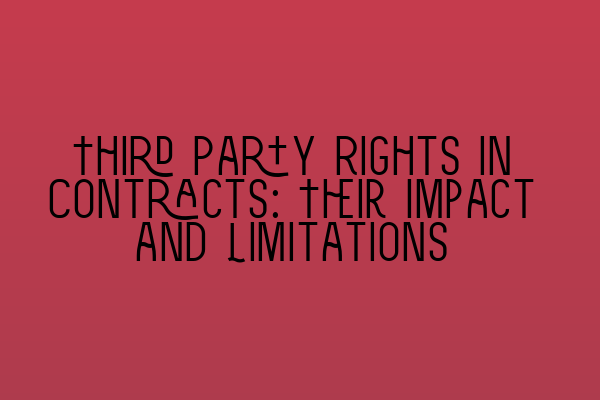Third Party Rights in Contracts: Their Impact and Limitations
When entering into a contract, it is crucial to consider not only the rights and obligations of the parties directly involved but also the potential impact on third parties. Third party rights in contracts can have significant implications, and understanding their limitations is essential to avoid potential disputes and legal issues.
What are Third Party Rights?
Third party rights refer to the rights granted to individuals or entities who are not directly involved in a contractual agreement but may still have a legal interest in its performance or enforcement. These rights can arise in various situations, such as when a contract explicitly confers benefits or imposes liabilities on third parties, or when third parties are intended beneficiaries of the agreement.
For example, let’s consider a construction contract where Party A contracts with Party B to build a house. Party C, the homeowner, is not a party to the contract but is intended to be the ultimate beneficiary of the construction. In this case, Party C may have certain rights and expectations regarding the quality and completion of the house, even though they are not directly involved in the contract.
The Impact of Third Party Rights
Third party rights can have significant implications for all parties involved in a contract. They can provide additional protection and enforceability to those who are not party to the agreement, but they can also create unforeseen obligations and liability for the contracting parties.
From the perspective of the contracting parties, third party rights can limit their freedom to modify or terminate the contract without considering the interests of the third party. This can be particularly relevant in situations where contracts involve the provision of goods or services to consumers, as consumer protection laws often confer rights upon consumers that cannot be waived by contract.
On the other hand, third party rights can offer valuable protection to beneficiaries who may have a direct interest in the performance or enforcement of a contract. These rights can include the ability to enforce contractual obligations, seek remedies for non-performance, or claim damages in case of breach.
Limitations of Third Party Rights
Although third party rights can have a significant impact on contractual relationships, it is important to note that they are not unlimited. There are certain limitations and considerations that need to be taken into account when dealing with third party rights:
- Intention to create rights: For a third party to have enforceable rights, it must be clear that the contracting parties intended to confer those rights upon the third party. This can be explicitly stated in the contract or inferred from the circumstances surrounding the agreement.
- Privity of contract: Parties who are not in privity of contract, meaning they are not direct parties to the agreement, may not have enforceable rights under the contract. Privity of contract generally limits the ability of third parties to enforce contractual obligations.
- Limitations in legislation: Some jurisdictions may have specific legislation that limits or regulates third party rights in contracts. It is important to be aware of these legal provisions to ensure compliance and avoid any potential disputes.
- Exclusion clauses: Contracting parties may include exclusion clauses to limit or exclude third party rights. These clauses can vary in their effectiveness and enforceability, depending on the jurisdiction and the specific circumstances.
In conclusion, third party rights in contracts can have a significant impact on the rights and obligations of the contracting parties, as well as on the interests of third parties. It is crucial to carefully consider and include provisions related to third party rights in contracts to ensure clarity, enforceability, and compliance with applicable laws and regulations.
For further information on legal practice and related topics, please refer to the following articles:
- Barrister vs. Solicitor: A Comprehensive Comparison
- Embracing the Rise of Virtual Law Practices
- Unveiling Real-Life Case Studies: Insights into Legal Practice and Decision-Making
- Exploring Solicitor Salaries in the UK: Average Earnings and Factors Affecting Income
- Mastering Client Relationship Management: Skills for Solicitors to Enhance Trust and Loyalty
